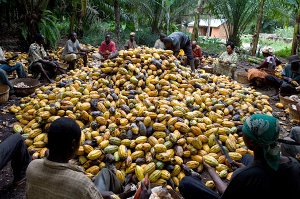 Cocoa farmers in the Honuta Traditional Area of the Ho West District are turning away from cocoa production to grow oil palm.
Cocoa farmers in the Honuta Traditional Area of the Ho West District are turning away from cocoa production to grow oil palm.
The predominantly cocoa growing area is giving up its role as a cocoa producer. Most of the cocoa plantations were destroyed by bush fires in 1983 and the perished cocoa trees were never replanted. The farmers now see oil palm production as the most rewarding and quick revenue making activity.
The cocoa sector has a bad history of delays in paying farmers for their produce and inadequate technical support. This is enough to discourage the production of the golden pod. Although the government instituted major reforms in the cocoa sector with the aim to streamline the purchasing system and to boost production, farmers in remote parts of the country are yet to enjoy the dividends.
The new thinking to switch from cocoa to oil palm is giving rise to a flourishing palm oil (zoomi) industry in Honuta and its surrounding villages and settlements.
The late Madam Josephine Abra Agbe, a resident of Honuta-Aflakpe pioneered the small-scale production of palm oil in the area. Until she became aged, Madam Abra was active in the organisation of local producers of palm oil and taught them the traditional method of producing palm oil to meet high standards. She organised a cooperative of small-scale producers of palm oil and was actively involved in the bulk purchase of the product from members for resale to customers.
The area has emerged as a major source of palm oil production in the Ho West District and there is ready market for the produce. Torgbui Agamusu II, Mankrado of Aflakpe, told The Accra Mail in an interview last weekend that most farmers in the area make oil palm their first choice. "We have buyers from Accra, Kumasi, Tema and other major cities who buy large quantities of the produce," he said.
The chief said that with the progress made so far he was optimistic that the palm oil industry has the potential to improve the economic situation of the people. "I personally got involved 13 years ago and purchased a locally made small-scale palm oil processor for the late Madam Abra for the production of palm oil.
"I have released vast tracts of land for an oil palm project and we have planted about 30 acres of oil palm that is being harvested. Our aim is to restore the prosperity of the people and to forget the bitter past and the untold hardship that the bush fires visited upon our people," he said.
The chief lamented that some palm wine tappers have been felling oil palm trees with useful economic life on large scale and warned that if the practice was not stopped it would bring about a set back to the blooming oil palm industry.
The soil in the Honuta area is rich in minerals and suitable for the growing of food crops such maize, cassava, and vegetables. The River Wutor that runs through the land has the potential for irrigation farming but its resources are yet to be fully tapped by the local people.
There are cashew trees growing in the wild, an indication that the land will support cashew cultivation, an industry that has become a national priority to support the non-traditional sector. Some prominent farmers that The Accra Mail contacted have indicated their intention to grow cashew on commercial basis in the near future. Reverend Jerome Agbe, a resident of Honuta-Aflakpe who is the leader and founder of Liberty Christian International Church in Accra also indicated that he would go into cashew production. He said he would contact the landowners for farmland as soon as he gets information on cashew cultivation from experts.
In another development, the Fiaga of the Honuta Traditional Area, Torgbui Ayisa V has appealed to the government and non-governmental oranisations to extend their poverty alleviation programmes to the area to improve the economic and social status of the people.
He said because the traditional area lacked trained teachers most parents have withdrawn their children from schools in the area to other areas with well- endowed education resources and the trend was causing the collapse of public schools in the locality. He called on all and sundry to help to reverse the situation.
The Fiaga said the traditional chiefs in the area have a plan to establish a clinic and an education fund to improve standard in education to secure the future of the youth.
General News of Thursday, 30 November 2000
Source: Accra Mail
Farmers Drop Cocoa For Oil Palm













